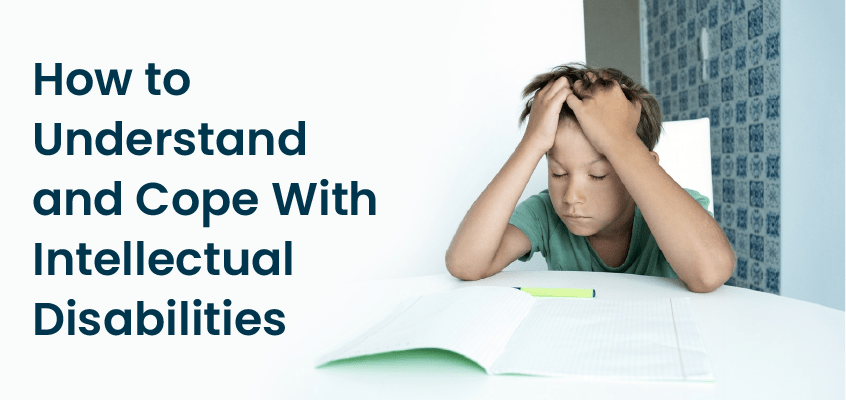Introduction
Intellectual disability, previously known as mental retardation, is a condition characterised by cognitive ability or intelligence that is below average. Intellectually disabled people may lack the skills required in daily life and can learn new skills; however, they know them slower than others. Different people suffer from varying degrees of this disability, ranging from mild to extreme.
What is intellectual disability?
It is a condition where people face limitations in their cognitive skills and functioning, including social, self-care, and communication skills. These limitations can cause them to learn and develop slowly compared to others. It can become apparent any time before we turn 18, and it is one of the most common developmental disabilities recorded these days.
The American Association on Intellectual & Developmental Disabilities considers a person to be living with an intellectual disability if they meet three criteria:
- The I.Q. is less than 70-75: The severity of Intellectual Disability is defined by I.C.D. 10 as:
- I.Q. level 50-55 to 70: Mild Intellectual Disability
- I.Q. level 35-40 to 50-55: Moderate Intellectual Disability
- I.Q. level 20-25 to 35-40: Severe Intellectual Disability
- I.Q. level below 20-25: Profound Intellectual Disability
- Significant limitations exist in various adaptive areas, such as the skills required to live and work in a community.
- The disability manifests before the person becomes 18 years old.
What are the signs of intellectual disabilities?
According to DSM-5, intellectual disorders are neurological disorders that show signs from childhood. Difficulties in social, practical, and conceptual parts of life characterise them.
To be diagnosed as living with this disability, our child needs to satisfy three criteria:
- During childhood, they have deficits in intellectual functioning, including problem-solving, abstract thinking, planning, reasoning, academic learning, judgment, and more.
- They have deficits in adaptive functioning, hampering their ability to conform to sociocultural and developmental standards in childhood.
- These deficits develop during childhood.
While living with severe intellectual disabilities may also suffer from other health problems like mood disorders, autism, anxiety, and seizures, as well as impaired vision, hearing, and motor skills.
What are the causes of intellectual disabilities?
Common causes of these disabilities include:
- Genetic factors: Atypical genes inherited from our parents, issues when genes combine, or certain other elements can sometimes cause intellectual disability. Common genetic conditions include Fragile X syndrome, phenylketonuria, and Down’s syndrome.
- Complications during pregnancy: If a baby fails to develop correctly inside the mother’s womb, it can lead to an intellectual disability. They are drinking alcohol during pregnancy, or getting an infection such as rubella when pregnant may also result in a baby with this disability.
- Problems during birth: Certain complications during labour and delivery, like the baby experiencing an extended period of oxygen deprivation, can cause it.
- Toxic exposure or certain diseases: Some diseases, such as measles, whooping cough, or meningitis, can lead to intellectual disability if left untreated. Extreme malnutrition, lack of appropriate medical care, or exposure to toxins such as mercury or lead can also develop this disability.
- Trauma before birth: Exposure to alcohol, drugs, and other toxins during the womb can cause it.
- Severe Malnutrition: Undergoing serious dietary issues and severe malnutrition can cause kids to develop intellectual disabilities.
How to understand and cope with intellectual disabilities
The more we research and understand this disability, the more we can help our children and deal with it ourselves. Several early intervention programs are available for babies and toddlers with these disabilities. In these programs, a capable team of professionals works with the parents to outline the child’s specific needs and provide them with the services and help they need to thrive. Some common forms of early intervention include speech therapy, Physiotherapy, training with special assistive devices, occupational therapy, nutrition services, and family counselling.
Treatments for intellectual disabilities
It is not a condition that can be treated and cured; it is a life-long condition. However, early intervention can improve the patient’s functioning and enable them to thrive. Underlying genetic or medical conditions can pose added complications, however.
After the condition’s diagnosis, getting help based on the person’s needs and strengths is essential. Several services are available these days for people with it and their families. These include:
- Early intervention for toddlers and infants
- Special education
- Transition services for the child to adult
- Support groups for families
- Day program for adults
- Vocational programs
- Case management
- Residential and housing options
Conclusion
According to Stanford-Binet and Wechsler Intelligence Scale for Children, over 1-3 per cent of the global population lives with an intellectual disability. It makes the number as high as 200 million. If you think your child could have this disability, take them to a specialist or developmental paediatrician as soon as possible. You can also contact your local early intervention agency for support. UnitedWeCare is a health platform that connects you with licensed mental health counsellors and therapists specialising in assessing, diagnosing, treating, and preventing mental illness and its symptoms. Contact us for expert guidance today!
| [1] | Psychiatry.org. [Online]. Available: https://www.psychiatry.org/patients-families/intellectual-disability/what-is-intellectual-disability. [Accessed: 03-Jan-2023]. |
| [2] | “Intellectual disability,” Medlineplus.gov. [Online]. Available: https://medlineplus.gov/ency/article/001523.htm. [Accessed: 03-Jan-2023]. |





